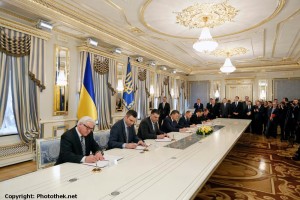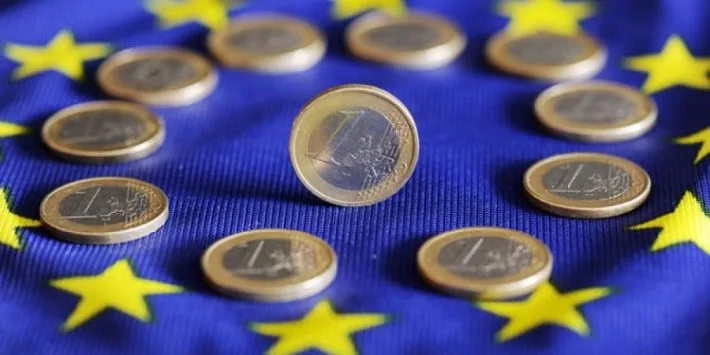Deal obtained with the mediation of EU and Russia (that hasn’t signed it however). The document establishes early elections and limits parliamentary powers. Police and protesters retiring
Back in their trucks, leaving their positions. After days of continual occupation, Ukrainian police officers are leaving the streets of Kyiv: the presidio in front of the parliament has been dismantled, water cannons used to hit protesters disassembled. Maybe this is the right time. President Yanukovich and the three main leaders signed an agreement aimed at ending the political crisis that has been unfolding for three months, and led to ferocious massacres of these days, with dozens and dozens of persons killed.
The deal, signed after a negotiation marathon involving a Russian representative (who hasn’t signed, en attendant instructions from Moscow) and the Foreign Ministers of France, Germany and Poland, sent by the Union, paves the way for early elections and for the limitation of Presidential powers.
The Parliament, as established by one of the five points of the agreement, has already voted the restoration of the 2004 Constitution, in which presidential powers were far more limited than in the current one – modified in 2010, in coincidence with Yanukovich’ raise to power. The Parliament is to be entitled again of appointing key ministers in a government. The signatories of the deal has also “declared their intention to create a coalition and form a national unity government within 10 days thereafter.”
Among other commitments, a constitutional reform to balance the powers of the President, the government and parliament, which will start immediately and be completed in September 2014. As far as the new Constitution is adopted, new elections will be held, no later than December 2014. A new Central Election Commission will be formed on the basis of proportionality and in accordance with the OSCE & Venice commission rules.

Government and opposition agreed on conducting investigation into recent acts of violence, under joint monitoring from the authorities, the opposition and the Council of Europe. Finally, authorities said they will not impose a state of emergency, and both the authorities and the opposition assured they will refrain from the use of violence. The Rada, as established, has adopted an amnesty covering the protesters involved in the violences of the last three months.
These positive developments are seen favourably by the European Union, that has dedicated an extraordinary Council to the situation in Ukraine, establishing sanctions against those respobsible for the violence, which are supposed to stay in force – even if Brussels underlines that much will depend on the development of the situation in the country. “President of the European Council Herman Van Rompuy has welcomed the agreement as “a necessary compromise in order to launch an indispensable political dialogue that offers the only democratic and peaceful way out of the crisis that has already caused too much suffering and bloodshed on all sides.” A statement issued in Brussels this afternoon added: “It is now the responsibility of all parties to be courageous and turn words into deeds for the sake of Ukraine’s future.”
Satisfaction expressed also by the EU representatives involved in the negotiations: “The Foreign Minister of France, Germany and Poland welcome the agreement reached for the crisis in Ukraine, praising the parties for their fortitude and call for an immediate stop to violence,” reads a statement of the German Foreign Ministry.
“The deal between the government and the opposition in Ukraine offers hope that the country has avoided the worst: escalation of violence and more deaths. I welcome the agreement,” said Martin Schulz, President of the European Parliament, “although the road to rebuilding trust and stability will not be easy.”
Letizia Pascale



![La bandiera della Regione Lombardia [foto: Wikimedia Commons]](https://www.eunews.it/wp-content/uploads/2022/09/lombardia.png.webp)








![Uffici Huawei a Roma [foto: imagoeconomica]](https://www.eunews.it/wp-content/uploads/2025/05/Imagoeconomica_1310298-120x86.jpg)
![La presidente della Commissione europea, Ursula von der Leyen, alla EU Budget Conference 2025 [Bruxelles, 20 maggio 2025]](https://www.eunews.it/wp-content/uploads/2025/05/vdl-bilancio-120x86.png)